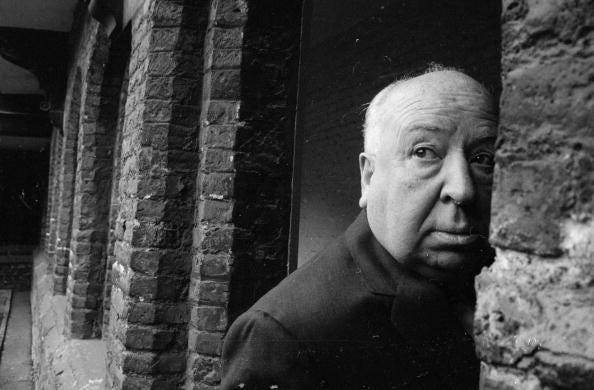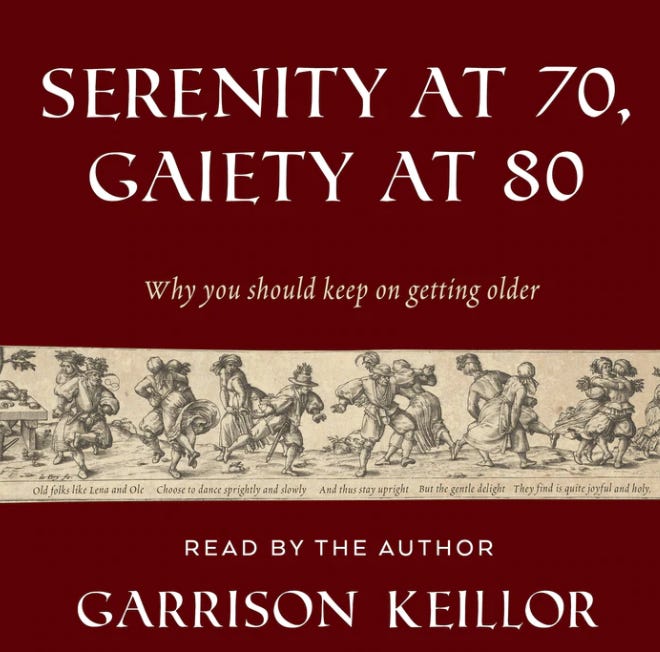“No Doctors Today, Thank You” by Ogden Nash from The Best of Ogden Nash. © Ivan R Dee, 2007.
ORIGINAL TEXT AND AUDIO - 2016
It’s the birthday of director Alfred Hitchcock, born in London (1899). His father was a greengrocer, and a strict man. Once, when the five-year-old Alfred misbehaved, his father sent him to the police station and they locked him in a cell for a few minutes to teach him a lesson. Hitchcock was so terrified that he was afraid of the police for the rest of his life, and he rarely drove a car so that he could not be pulled over.
Hitchcock directed great suspense and horror films, including Rebecca (1940), Notorious (1946), Rope (1948), Dial M for Murder (1954), Rear Window (1954), Vertigo (1958), Psycho (1960), and The Birds (1963). He was a notoriously difficult director — he knew exactly how he wanted the entire film to look as soon as he and the writers had finished going through the script, and he was known to refer to his actors as “cattle.” Critics have interpreted Hitchcock’s behavior as a director in countless ways, writing long treatises on how he channeled his own repression, passions, and other psychological issues into his films and his treatment of his actors. But his life off the set seems to have been relatively quiet and uneventful. In 1926, he married Alma Reville, his assistant. They had a close working relationship — Alma went through every detail of each of her husband’s films, pointing out whenever the dialogue sounded slightly wrong, or there was a slight flaw in the filming. Hitchcock was rumored to fall for many of his blond leading ladies, despite a lack of affection in return; and he often remarked to interviewers and friends that he was celibate, or impotent, or both. Whatever his married life was like, he and Alma were devoted enough to each other that they remained married until Hitchcock’s death more than 50 years later. They enjoyed going to art galleries and dining out.
Hitchcock had a legendary appetite. He liked to say, “I’m not a heavy eater. I’m just heavy, and I eat.” Apparently, shortly after Hitchcock came to America from England, he went out to New York City’s 21 Club. Hitchcock ordered a steak dinner, followed by an ice cream parfait; then he ordered another steak dinner, and another ice cream; and then the entire thing one more time. At the end of his three meals and three desserts, he drank a cup of strong tea and a glass of brandy, and told his companions: “There is as much anticipation in confronting good food as there is in going on a holiday or seeing a good show. There are two kinds of eating — eating to sustain and eating for pleasure. I eat for pleasure.” He had a full wine cellar in his home in Bel Air, and he had a soft spot for Burgundy wines, which is why he featured one so prominently in Notorious. Alma was a great cook. Her husband liked to help in the kitchen, and the couple often hosted large dinner parties. When Hitchcock received the American Film Institute’s Life Achievement Award in 1979, he said: “I beg permission to mention by name only four people who have given me the most affection, appreciation, and encouragement, and constant collaboration. The first of the four is a film editor, the second is a scriptwriter, the third is the mother of my daughter, Pat, and the fourth is as fine a cook as ever performed miracles in a domestic kitchen. And their names are Alma Reville.”
He said, “The length of a film should be directly related to the endurance of the human bladder.”
It’s the birthday of novelist Tom Perrotta, born in Garwood, New Jersey (1961). He grew up in blue-collar Newark, idolizing Bruce Springsteen. After he went on to study creative writing and started publishing his own novels, he didn’t want to distance himself from his New Jersey life. He said: “I like to write simply and clearly. I never wanted to write for the guys I met in college; I wanted to write for the guys I grew up with who weren’t literary sophisticates. I have an allergy to fancy writing.”
His books include Election (1998), Little Children (2004), and The Abstinence Teacher (2007). His most recent novel is The Leftovers (2011), about what might happen if the Rapture didn’t quite live up to evangelical expectations. Stephen King called it “the best Twilight Zone episode you never saw — not ‘The Monsters Are Due on Maple Street,’ but ‘The Monsters Are Us in Mapleton.’”
It’s the birthday of American sharpshooter Annie Oakley (1860), born Phoebe Ann Mosey in a log cabin just north of what is now Willowdell, in Darke County, Ohio. Her parents were Quakers from Hollidaysburg, Pennsylvania. Oakley’s father died of pneumonia when she was six, which sent her mother into a financial tailspin. Oakley was the sixth of nine children, and she and her sister were sent to the Darke County Children’s Infirmary, where they learned to cook and sew. After a few years, Oakley was “bound out” to a local family, who expected her to be able to cook, pump water, and care for their child. Oakley was small and the couple was unkind; they beat and starved her and left her outside in freezing weather without shoes. She called them “the wolves” and after two years, she ran away and returned to her mother.
Oakley had been trapping animals since she was seven and was shooting and hunting animals to support her family by the time she was eight. When she returned to her mother, she began selling her game to local shopkeepers, who shipped it to cities like Cincinnati. Oakley’s shooting prowess became well known in Darke County and greater Ohio.
On Thanksgiving Day of 1875, the Baughman & Butler shooting act came to Cincinnati. Frank Butler, a charming Irish immigrant, bet $100 that no local could best him in a shooting match. Local shopkeepers presented Annie Oakley. Frank Butler said: “I almost dropped dead when a slim girl in a short dress stepped out to the mark with me. I was a beaten man the moment she appeared.” Oakley won and she married Butler a year later.
For more than 50 years, Annie Oakley and Frank Butler traveled the world, wowing audiences with Oakley’s marksmanship. From 30 paces, she could split a playing card held edge-on, hit dimes tossed into the air, and split cigarettes from between her husband’s lips. When she joined Buffalo Bill’s Wild West traveling show (1885), she was the star attraction, earning $100 a week, more than any man in the troupe. Buffalo Bill’s troupe crossed the United States and did several European tours. Oakley met King Umberto of Italy and the Queen of England, who told her, “You are a very clever little girl.” Lakota leader Sitting Bull nicknamed her “Little Miss Sure Shot.”
Oakley campaigned for women’s rights and even volunteered to train 50 women sharpshooters for the Spanish Civil War and World War I, though she was turned down both times. She said, “I would like to see every woman know how to handle guns as naturally as they handle babies.”
Thomas Edison filmed Oakley and the Buffalo Bill troupe at his studio in West Orange, New Jersey, turning the film into nickelodeons. People paid five cents apiece to see Annie Oakley. She was the most famous woman in the world for a time.
Annie Oakley continued to shoot and perform into her 60s. When she died, Frank Butler was said to be so bereaved he stopped eating and died several days later. Annie Oakley is still the most famous cowgirl in history.
She said: “Aim at the high mark and you will hit it. No, not the first time, not the second time, and maybe not the third time. But keep on aiming and keep on shooting, for only practice will make you perfect. Finally, you’ll hit the bull’s-eye of success.”
Be well, do good work, and keep in touch.®
TO PURCHASE - CLICK HERE






I'm grateful you point me to the word "gaiety"!